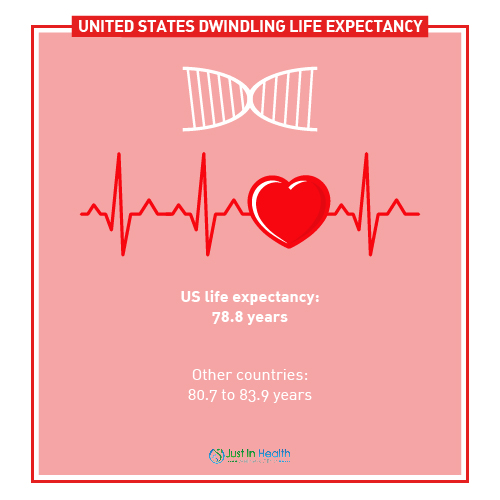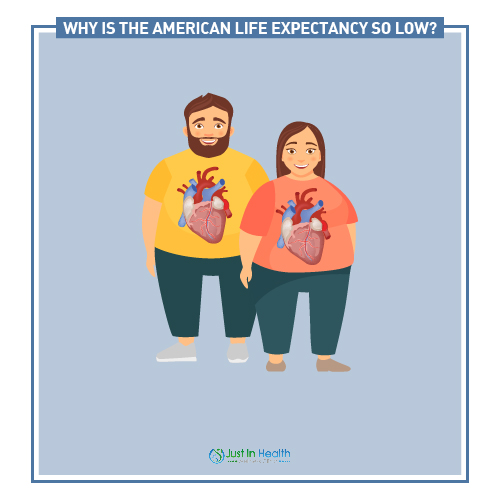

By Dr. Justin Marchegiani
The United States has not kept pace with other developed, high income countries, despite spending nearly twice as much on healthcare. While life expectancy in the US had been rising since 1959, in 2014 things started to swing the other way, according to new findings.
One study found that though the United States spent nearly twice as much on medical care as 10 high-income countries, the US still performed worse on population health outcomes.
The US is spending more on healthcare, and yet the life expectancy is dropping compared to previous years, and general health is worse than in other countries. What’s going on?
There are many factors that may be at play, from the lifestyle of the average American to how the United States society and health care systems function. Let’s dive in!
Life expectancy is the statistical average number of years someone will live. One way researchers determine this number is by analyzing the data and lives of many people with the same birth year.
What is interesting about life expectancy is that depending on your age, your life expectancy can change. For example, a 20 year old may have a shorter life expectancy than a 60 year old, as the 60 year old has already lived through many risk factors associated with the 40 year lead they have.
Factors that influence life expectancy include an individual’s, and a society’s, access to healthcare, their diet and lifestyle choices, and economic status.
The United States has lower life expectancy than its developed peers, including countries such as the United Kingdom, France, Germany, the Netherlands, Sweden, Switzerland, Denmark, Australia, Japan and Canada.
US life expectancy: 78.8 years
Other countries: 80.7 to 83.9 years
On average, people in other countries can expect to live anywhere from one to five extra years when compared to the US! What is perhaps even more concerning is recent findings by the National Academy of Sciences who report that Americans have some of the lowest chances among its peers of living to 50.
Those Americans who do live past 50 have higher rates of disease and illness, and generally less health and vibrancy, than those in other countries.
Life expectancy doesn’t just apply to long lives: it also includes infant mortality. Unfortunately, the United States also sees the higher infant mortality rate at 5.8 deaths per 1,000 births.

Fortunately, there are reasons why life expectancy is shorter or longer. If we look at the risk factors for shorter lifespan, we can gain insight into what other countries are doing right and implement this information to improve our own odds! Common risk factors include:
Obesity and Diabetes: It’s so secret America is morbidly obese. Roughly 70% of the American population is overweight or obese, as compared to our peers, which have rates ranging from 23-63%. Obesity is a trigger for many other common causes of mortality, such as heart disease.
In addition to high rates of obesity, American adults also have the highest rates of diabetes, and the number is continuing the climb. Over 12% of Americans have diabetes, and it is estimated that 1 in 3 adults over 20 have pre-diabetes. If it’s not properly addressed, prediabetes develops into full-blown type 2 diabetes in 15-30% of cases within 5 years.
And if the trend continues? 1 in 5 will have diabetes within the next 5 years.
Obesity and Diabetes Prevention: Two of the most critical things you need to focus on–not just for diabetes prevention, but for overall health–are diet and exercise. The importance of cooking at home with real organic whole foods versus eating chemical-laden fast food cannot be overstated. 
I am an advocate for the paleo and ketogenic diets, or even better, combining the two. By eating organic vegetables, grass fed meat, and healthy fats and limiting sugar, grains, and processed foods, you are setting yourself up for success.
Exercise doesn’t have to be a chore. Find a sport or activity that entertains you: it may be joining your office’s softball league, taking an after-work Zumba class, or riding your bike around the block. Heck, take the stairs instead of the elevator! Any sort of movement that you incorporate into your lifestyle will do you a world of good.
American Healthcare & Medical Errors: The US healthcare system is medicine-oriented, and doesn’t put much emphasis on prevention. This may play a part in why the United States has double the medical spending, but worse outcomes. Prevention is not profitable.
Johns Hopkins estimates that over 250,000 Americans die each year from medical errors. Medical errors are the 3rd leading cause of death in the US, ranking just behind heart disease and cancer. If we can prevent illnesses from the get go, we can eliminate the need to be in the medical system, reducing our chances of being a victim of medical error.
Other causes of lower life expectancy include drug overdoses, alcohol abuse, and suicides.
Obviously the United States is missing something if the health care spending is double, but the life expectancy, and even the quality of life, is poorer than it is in other peer countries. American dietary guidelines are missing critical pieces of the puzzle and the standard American diet is high in sugar, refined carbs, and processed foods.
If we wish to increase not just the quantity of years, but also the quality of our years, we must take a more preventative approach when it comes to health. Rather than going to the dentist to have a cavity filled (treating a problem), we can use our knowledge to avoid getting the cavity in the first place (preventative care).
References:
https://www.bmj.com/content/353/bmj.i2139
https://jamanetwork.com/journals/jama/article-abstract/2756187
https://www.ncbi.nlm.nih.gov/pmc/articles/PMC6092679/
https://jamanetwork.com/journals/jama/article-abstract/2674671?redirect=true
https://www.nap.edu/catalog/13497/us-health-in-international-perspective-shorter-lives-poorer-health
https://www.ncbi.nlm.nih.gov/pubmed/31769830